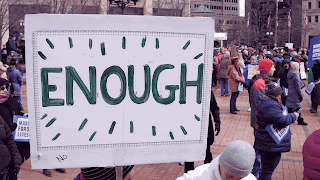It was in this context that American workers held the first Labor Day parade, marching from New York’s City Hall to a giant picnic at an uptown park on Sept. 5, 1882.
The
America Labor movement had begun and over the next century we would see
a minimum wage, 40 hour work week, child protection laws, etc...
Personally, I celebrate Labor Day by relaxing and hiding from the world. It's MY day. I do this for my grandmother, who in her early twenties, back in 1922, had the misfortune of working in a Detroit auto-factory where one of the giant presses skipped a beat and took three fingers off her right hand. A hand you wouldn't see because she kept it hid behind her purse, or wore gloves whenever possible.
I can't imagine the pain she must have felt that day as they took her away screaming with a greasy rag over her hand. She didn't speak much about the accident, but she did speak about the employer who gave her a one-week's pay before letting her go because she no longer had two good hands. That was all she got. She would join in labor strikes after that, showing off her hand as a reason to fight for justice from greedy employers who choose profits over worker's safety.
Why am I writing about Labor on an Esoteric blog? Truth is, the Esoterics have always been for workers.
For example, the argument that, Pythagoras and his students were for the workers of the day can be made by his philosophy that the basic property of numbers was
expressed in the harmonious interplay of opposite pairs, and that, harmony assured
the balance of opposite forces. This obviously means there must be a balance between the workers and the profiteers.
Freemasons like Uriah Stephens who created a "brotherhood" to bring together every laborer, mechanic, and artisan who desired professional improvement, was founded in 1869, and was inspired by the ritual and lessons he himself had learned as a Mason in his Philadelphia Lodge.
Probably the greatest testament to esoterist involvement in Worker's Rights is none other than Madame Blavatsky. That's right, the woman who gave us the Secret Doctrines which is the foundation for most esoteric studies today, was also a supporter of worker's rights.
Annie Besant was a Theosophist who studied under Blavatsky during the last years of Blavatsky's life. In her biography, Besant gives a written documentation of Madame Blavatsky's support of the early labor movement in England. Besant writes, "Thus was ushered in 1889, the to me never-to-be-forgotten year in which I found my way 'Home,' and had the priceless good fortune of meeting, and of becoming the pupil of, H.P. Blavatsky."
Besant goes on to explain her personal growth in Spiritualism from her studies with Blavatsky, but also tells of her involvement in fighting for the working class people, more precisely, the "Female Labor" called the Matchmaker Girls, which Besant called "White Slavery" in an article in which she points out: "A typical case is that of a girl of sixteen, a piece-worker; she earns 4s(English Shillings) a week... out of the earnings 2s. a week is paid for the rent of one room. The child lives only on bread and butter and tea, alike for breakfast and dinner...."
Besant's article title "White Slavery" got the girls fired and Besant sued for libel. The factory owner won the law suit by paying the workers to lie, and painting Besant as an evil atheist -- worked everytime in 1882. Without jobs the workers were thrown out on the streets and Besant trashed in the newspapers. Still, Besant wanted to give the woman a home filled with "comradeship, and self-respecting freedom." This is where H.P. Blavatsky steps in.
Besant writes in her autobiography: "On August 15th it (the women's home) was opened by Madame Blavatsky, and dedicated by her to the brightening of the lot of hardworking and underpaid girls...Very tender was H.P.B.'s heart to human suffering, especially to that of women and children. She was very poor towards the end of her earthly life, having spent all on her mission, and refusing to take time from her Theosophical work to write for the Russian papers which were ready to pay highly for her pen. But her slender purse was swiftly emptied when any human pain that money could relieve came in her way. One day I wrote a letter to a comrade that was shown to her, about some little children to whom I had carried a quantity of country flowers, and I had spoken of their faces pinched with want. The following note came to me:
My Dearest Friend, I have read your letter...and my heart is sick for the poor little ones! Look here; I have but 30s. of my own money of which I can dispose (for as you know I am a pauper, and proud of it), but I want you to take them and not say a word. This may buy thirty dinners for thirty poor little starving wretches, and I may feel happier for thirty minutes at the thought. Now don't say a word, and do it: take them to those unfortunate babies who loved your flowers and felt happy. Forgive your old uncouth friend, useless in this world!
Ever yours,
H.P.B
That's my Madame Blavatsky Labor Day story. On an interesting note, I will leave you with this passage written by Annie Besant about her work in 1882. It was written over a hundred and forty years ago, but seems like something written today.
This branch of our work led to a big fight -- a fight most happy in its results. At a meeting of the Fabian Society, Miss Clementina Black gave a capital lecture on Female Labor, and urged the formation of a Consumers' League, a pledged only to buy from shops certificated 'clean' from unfair wage....
~~ Eso Terry







